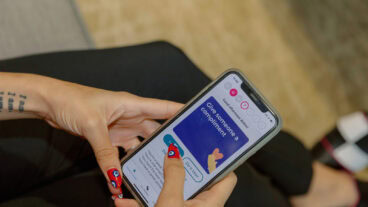The ‘Maestro’ project is the first application developed that can completely search and browse the Internet via voice interface. (Photo: Dani Machlis)As a researcher specializing in human factors in driving, Dr. Meirav Taieb-Maimon is very concerned about the Internet. After all, if using cellular phones has caused a great number of accidents, she surmises, what is the ability to surf the Web while on the road going to do?
As technology advances, an increasing number of cars are going to become equipped with full internet capabilities. Whether integrated into the car itself, or with the ability to plug laptop computers into the car system, full access to the internet while at the wheel is simply a matter of time.
“It’s inevitable,” says Taieb-Maimon, a faculty member at Ben-Gurion University of the Negev. “With more and more people now working out of the office and trying to be productive as they travel, these kinds of systems are being developed and used. People want to use their driving time to work,” she told ISRAEL21c.
Currently, however, the systems being used involve pushing buttons to navigate the web, which means taking ones hands off of the wheel and eyes off of the road.
Taieb-Maimon is certain that advanced voice recognition capabilities – the ability to speak to the Internet and hear results vocally – will out of necessity be the wave of the future for those who want to develop auto internet capabilities while minimizing the potential dangers with drivers so distracted.
But in order to conduct research on the safety effects of such technology, Maimon and her colleagues at BGU have developed a new application of the future for drivers – a completely voice-based information retrieval search engine project.
The ‘Maestro’ project is the first application developed that can completely search and browse the Internet via voice interface – using only a microphone and speakers so that you can ‘ask’ the computer questions and ‘hear’ the answers. Taieb-Maimon will display Maestro publicly for the first time this week Wednesday at a conference of BGU Engineering projects as part of the events for the university’s annual Board of Governors meeting.
According to Taieb-Maimon, the system lets the user verbally dictate a query to a search engine phrased as a free text. Just as you would present a written query to a regular search engine and see a list of results, you can speak your query into Maestro and listen to the results, read to you vocally and smartly arranged to help you get to the information you need as quickly as possible.
The project combines various components to provide the abilities of voice recognition and text to speech features. Besides the voice recognition ability, the system allows selection of the different properties from search engine type, number of results returned, search methods and styles to voice pitch and volume settings.
“All of the components were available and are being used in other ways, but we were the first one to put everything together,” said Lior Limonad, a graduate student in Information Systems who took the lead in designing Maestro, together with students Moshe Adler and Ilan Bar under the advisory of Taieb-Maimon’s colleague Dr. Bracha Shapira.
The purpose of the new tool was to check what happens when drivers can surf the web for information without moving their eyes from the road.
“The effects of these systems on drivers must be investigated before approved for use while driving,” Taieb-Maimon said. “There has already been some research studies on the effects of checking e-mail while driving, together with research on cellular phone use, but no one has investigated search engines or any other kind of Web surfing.”
Now that she has developed the tool, she is preparing to study the effect of using the Internet search engine on driving-related measures – comparing this to driving without using these systems or to the level of distraction while conversing with a passenger.
Using simulators, she also plans to study whether vocal internet use is learning dependent – whether using it while driving might improve with repeated experience. She and her team are in the process of finding grant funds to support the next step of their research.
“We believe that the results of the study will have important implications for driving safety,” she said, adding that she hopes the results of her research will help shape the future design of such systems, with the goal of “minimizing the distraction of drivers’ attention and the deterioration in driving-related accidents.”
Taieb-Maimon, 35, married and the mother of a six-year-old daughter, was born and raised in Beersheva. In 1992, she graduated with her B.Sc in Industrial Engineering and Management from BGU. She then continued to pursue her Ph.D at BGU specializing in road safety issues as a Kreitman scholar, for which she received a government grant from the Israeli Transportation Ministry together with her advisor Prof. David Shenhar, after which she conducted post-doctoral research at the Technion.
In 2003 she returned to Beersheba as a member of the BGU Department of Information Systems Engineering. “I was really happy about that because for me this university is my second home.”
Soon after, she began to collaborate on this and other projects with her friend and colleague Shapira, a specialist in information retrieval.
Though the idea of using Internet while driving is unfamiliar and initially seem frightening, Taieb-Maimon says, the concrete dangers go beyond that – the deleterious effects of these systems on drivers have to be investigated before approved for use while driving.












